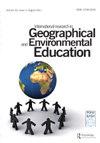变化世界中的联系——地理与环境教育国际研究的反思
IF 3.1
Q2 EDUCATION & EDUCATIONAL RESEARCH
International Research in Geographical and Environmental Education
Pub Date : 2021-09-29
DOI:10.1080/10382046.2021.1981037
引用次数: 2
摘要
国际地理与环境教育研究(IRGEE)将于2022年庆祝成立30周年。我们的创始编辑肯定会设想,该杂志将为地理和环境教育领域的高质量出版物提供一个出口。该期刊当然没有辜负人们的期望——自2019年以来,它已成为Scopus教育领域的顶级期刊。大约30年前,Rod Gerber和John Lidstone在创刊号上写的社论以“说我们生活在一个不断变化的世界已经成为一种老生滥调”(Gerber & Lidstone, 1992年第1页)开头。第一期策划了关于教学大纲设计(Stoltman, 1992),帮助学生解决地理问题(Lee, 1992),地图阅读(Gerber, Lidstone, & Nason, 1992),加强地理探究(Neighbour, 1992)的原创研究文章。以及对环境问题的认识(Karpik, 1992)。事实上,第一期的任何论文标题都会引起2021年在IRGEE上阅读的人的兴趣。似乎这句话在三十年后仍然非常有效,重申了该杂志在记录地理和环境教育学术话语发展方面的相关性。考虑到IRGEE在过去三十年的历程,“联系”的概念被用作最近于2021年8月在布拉格举行的国际地理联盟(IGU)地理教育委员会(CGE)会议的主题,这篇文章被用来构建框架。当我们回顾这几十年来杂志上的论述时,三种类型的联系变得明显。首先,地理与环境教育的联系从一开始就体现在期刊的名称上。该杂志的创刊正值第一个《国际地理教育宪章》(下文简称《宪章》)正在制定之时。事实上,《宪章》是1992年由政府间联盟出版的,同一年,伊斯兰难民观察组出版了其第一卷。《宪章》明确说明了地理教育和环境教育之间的关系。事实上,地理教育有助于环境教育,因为它“确保个人意识到他们自己的行为和社会的行为的影响,有机会获得准确的信息和技能,使他们能够作出无害环境的决定,并发展一种环境伦理来指导他们的行动”(环境专家小组)。包括“地理”和“环境”教育不仅是一个方便的巧合,而且它代表了为了一个共同目标而强调这两个工作领域之间的联系的意图。本文章由计算机程序翻译,如有差异,请以英文原文为准。
Connections in a changing world – reflections from international research in geographical and environmental education
International Research in Geographical and Environmental Education (IRGEE) celebrates its 30th anniversary in 2022. Our founding Editors would certainly have envisioned that the journal would provide an outlet for top quality publications in the fields of geographical and environmental education. The journal has certainly lived up to that expectation – it has become a top tier journal in the education domain in Scopus since 2019. The editorial in the inaugural issue some 30 years ago written by Rod Gerber and John Lidstone started with the sentence “It has become a cliché to say that we live in a changing world” (Gerber & Lidstone, 1992 p. 1). The first issue curated original research articles on syllabus design (Stoltman, 1992), helping students solve geographical problems (Lee, 1992), map reading (Gerber, Lidstone, & Nason, 1992), enhancing geographical inquiry (Neighbour, 1992), and awareness of environmental issues (Karpik, 1992). In fact, any of the paper titles in the first issue are of interest to someone reading an issue in IRGEE in the year 2021. It seems that the sentence still holds immense validity thirty years on, reaffirming the relevance of the scope of the journal in documenting the developments in the academic discourses on geographical and environmental education. As a way to consider IRGEE’s journey over the last three decades, the notion of ‘connections’, as used as the theme of the recent International Geographical Union (IGU) Commission on Geographical Education (CGE) Conference in Prague in August 2021, is utilised to frame the article. Three types of connections become apparent as we look back at the discourses in the journal over these few decades. Firstly, the connection between geographical and environmental education has been featured in the journal’s title right from the beginning. The founding of the journal happened at a time when the first International Charter for Geographical Education (referred to as the Charter for the rest of this article) was being formulated. In fact, the Charter was released by IGU in 1992, the same year that IRGEE published its first volume. The relationship between geographical and environmental education was made explicit in the Charter. Indeed, geographical education contributes to environmental education by “ensuring that individuals become aware of the impact of their own behaviour and that of their societies, have access to accurate information and skills to enable them to make environmentally sound decision, and to develop an environmental ethic to guide their action” (CGE, 1992 p. 9). The inclusion of both “geographical” and “environmental” education was not just a convenient coincidence but it represents the intention to highlight the connection between these two domains of work for a common goal.
求助全文
通过发布文献求助,成功后即可免费获取论文全文。
去求助
来源期刊

International Research in Geographical and Environmental Education
EDUCATION & EDUCATIONAL RESEARCH-
CiteScore
5.20
自引率
33.30%
发文量
11
期刊介绍:
International Research in Geographical & Environmental Education publishes quality research studies within the context of geographical and environmental education. The journal endeavours to promote international interest and dissemination of research in the field, provides a forum for critique, and demonstrates the relevance of research studies to good professional practice.
 求助内容:
求助内容: 应助结果提醒方式:
应助结果提醒方式:


